 Our World
Our World  Our World
Our World  Crime
Crime 10 Dark Details of the “Bodies in the Barrels” Murders
 Animals
Animals The Animal Kingdom’s 10 Greatest Dance Moves
 Movies and TV
Movies and TV 10 Box Office Bombs That We Should Have Predicted in 2025
 History
History 10 Extreme Laws That Tried to Engineer Society
 History
History 10 “Modern” Problems with Surprising Historical Analogs
 Health
Health 10 Everyday Activities That Secretly Alter Consciousness
 History
History Top 10 Historical Disasters Caused by Someone Calling in Sick
 Animals
Animals 10 New Shark Secrets That Recently Dropped
 Movies and TV
Movies and TV 10 Forgotten Realities of Early Live Television Broadcasts
 Our World
Our World 10 Places with Geological Features That Shouldn’t Exist
 Crime
Crime 10 Dark Details of the “Bodies in the Barrels” Murders
 Animals
Animals The Animal Kingdom’s 10 Greatest Dance Moves
Who's Behind Listverse?

Jamie Frater
Head Editor
Jamie founded Listverse due to an insatiable desire to share fascinating, obscure, and bizarre facts. He has been a guest speaker on numerous national radio and television stations and is a five time published author.
More About Us Movies and TV
Movies and TV 10 Box Office Bombs That We Should Have Predicted in 2025
 History
History 10 Extreme Laws That Tried to Engineer Society
 History
History 10 “Modern” Problems with Surprising Historical Analogs
 Health
Health 10 Everyday Activities That Secretly Alter Consciousness
 History
History Top 10 Historical Disasters Caused by Someone Calling in Sick
 Animals
Animals 10 New Shark Secrets That Recently Dropped
 Movies and TV
Movies and TV 10 Forgotten Realities of Early Live Television Broadcasts
10 Incredible People With Incredibly Unfortunate Names
When you’re cursed with a humiliating name, it can feel like there’s no way to outlive it—like you could change the course of history and still only be remembered as the guy whose parents named him “Dick Small.” It’s a pain known too well by every little boy named Willie and every substitute teacher who’s had to tell her class that her name is “Mrs. Cockswell.”
Some people, though, didn’t let that stop them. They went out into the world and did incredible things—the types of things we’d learn about in every history class if we could only get through a unit without middle schoolers giggling at every mention of “Bushrod Johnson” or “Emperor Pupienus.”
10 Dick Bong
America’s Greatest Flying Ace
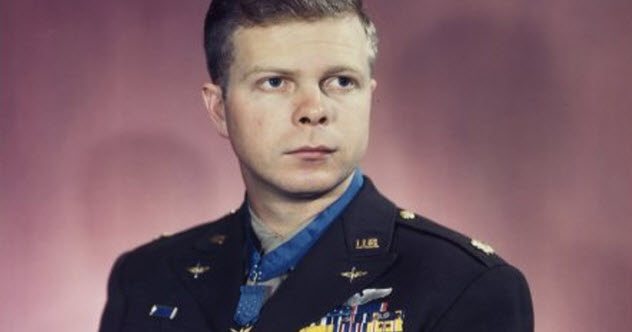
He’s been called the “Ace of Aces,” “the bravest of the brave,” and “America’s greatest World War II pilot.” But to those who knew him, he was just Dick Bong.
Dick Bong shot down more enemy planes than any other American pilot. He signed up to fight in the war just months before the Japanese attacked Pearl Harbor and soon found himself in dogfights with Japanese pilots above the Pacific Ocean.
Any man could have lost his nerve in those aerial battles, but Dick Bong stayed firm, no matter how high he got. To him, combat flying was nothing but a “great game that made life interesting”—and that made him an incredible killer. Bong only served in the army for two years, but during that short time, he shot down an unprecedented 40 enemy planes.
In most places, Dick Bong is all but forgotten. We learn about the Red Baron and Charles Lindbergh, but somehow, Major Bong never makes it into the history books. In his hometown, though, he is still revered. After his death, Poplar High School even set up an entire room as a Bong museum called the “Bong Memorial Room”—although, for some reason, they ended up having to move it into a building with fewer teenagers.[1]
9 Ali Bitchin And His Bitchin Mosque

Ali Bitchin, one of the most powerful men of the 17th century, started off life as a slave named Piccini. But everything changed when he got the Bitchin name.
At age 10, young Piccini was captured by the Algerian army and sold to a band of pirates. The pirates taught him to plunder and steal upon the open seas and changed his name. Soon, there was no word more feared on the Mediterranean Sea than “Bitchin.”
The pirate Bitchin plundered so much money that he’d become one of the wealthiest men in Algiers by the time he was an adult. It wasn’t just that he was rich—he was moving so much money around that he was single-handedly one of the country’s biggest sources of wealth.
He left behind one landmark, though, that would ensure that nobody ever forgot the Bitchin name. To win the love of a beautiful princess, Bitchin built a massive, beautiful mosque that still bears his name to this day.[2] In fact, the UN now protects it as part of a UNESCO World Heritage Site, lest the world ever lose his Bitchin Mosque.
8 Dr. Gay Hitler
Son Of George Washington Hitler

Circleville, Ohio, is a town built by Hitlers. Little mementos commemorating the importance of the Hitlers are all over the town—from the beautiful waters of Hitler Pond to the greenery of Hitler Park and even across its many roads named for Hitlers.
These roads, though, aren’t named for Adolf. They’re named for the good, decent Hitlers who built the community. Men like George Washington Hitler; his son, Dr. Gay Hitler; and the very first Hitlers who settled Circleville.
When Dr. Gay Hitler opened a dental center downtown in 1922, his name was nothing more than a sign of pride and connection to the community’s heritage. It only took a few more years, though, for that to change. When the first news reports on fascism’s rise in Berlin started spreading through the country, calling yourself a Hitler stopped being something to brag about.
It was hardest for Dr. Gay Hitler’s brother, George, who had moved to Akron. His boss was so afraid of having a Hitler on staff that he tried to bully George Hitler into changing his name.
In Circleville, though, the name still held its dignity, and the population never turned their backs on the Hitlers. To this day, they refuse to change the signs that bear the name “Hitler.” Even in the darkest times, Circleville alone was a place where a man could hold his chin up with pride and declare that he was Gay Hitler.[3]
7 Bushrod Johnson
Underground Railroad’s Confederate General
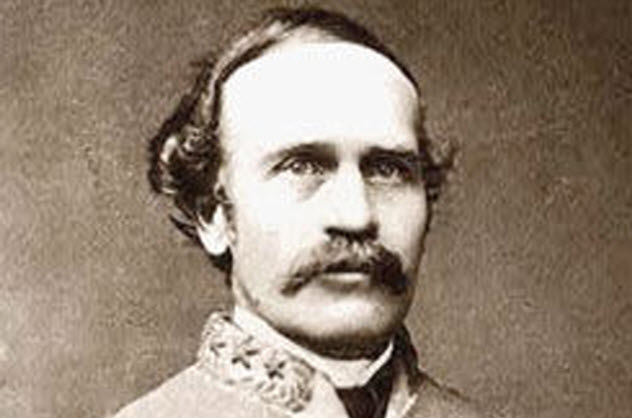
Of all the figures in the American Civil War, none is more exciting than Bushrod Johnson. He is the only person who both freed slaves in the Underground Railroad and fought to keep them in chains as a Confederate general.
Johnson grew up in Ohio, born to a family of staunch abolitionists. His uncle was heavily involved in the Underground Railroad and, when Johnson became a teenager, he joined his uncle. Johnson started helping to guide escaped slaves from the plantations and to freedom in the North.
When the Civil War broke out, though, Johnson was living in Tennessee, working as a professor. To everyone’s surprise, he joined the Confederate Army.
Johnson didn’t exactly have a change of heart—he just wasn’t allowed in the Union Army. He’d been court-martialed during the Mexican-American War, and the Union didn’t want him anymore. On the other hand, his new home of Tennessee had made him a wealthier man than he’d ever been. And for all he worried about the rights of slaves, he was much more concerned about becoming poor again.
Johnson rose to the rank of general in the Confederate Army and even led them to one of their greatest victories in the Battle of Chickamauga. And he did it all in incredible shame. Throughout the war, he asked those who knew what he was doing to lie for him and tell his family that he was fighting for the Union.[4]
6 Misty Hyman
World Record–Setting Swimming Champion

Nobody expected Misty Hyman to break a world record when she lined up to compete in the 2000 Summer Olympics. After all, Hyman was up against a far more experienced woman: Susie O’Neill, the woman who had set the record for the fastest 200-meter butterfly in the world.
Young Hyman had everything against her. She was asthmatic and shorter than her opponents. Physically, she didn’t have an advantage over any of them. Her only chance, she believed, was to use a better strategy—and so Hyman tried something none of the girls had ever tried before.
She used a technique called the “underwater dolphin kick.” It was a difficult maneuver that required her to kick on her side—a technique that was usually considered more of a gimmick than a way to swim quickly. Hyman used it so effectively, though, that she blasted past the competition, winning a gold medal for the United States and setting a new record for the fastest butterfly stroke in Olympic history.
It was such an incredible upset that her opponents insisted that she had to be using steroids. There’s no proof that Misty Hyman was anything but pure, though, and her new ideas have changed swimming forever. Since her record-shattering swim, Olympic swimmers have been copying her underwater dolphin kick technique. Because of Misty Hyman, competitive swimming will never be the same.[5]
5 Dick Pound
Founder Of The World Anti-Doping Agency
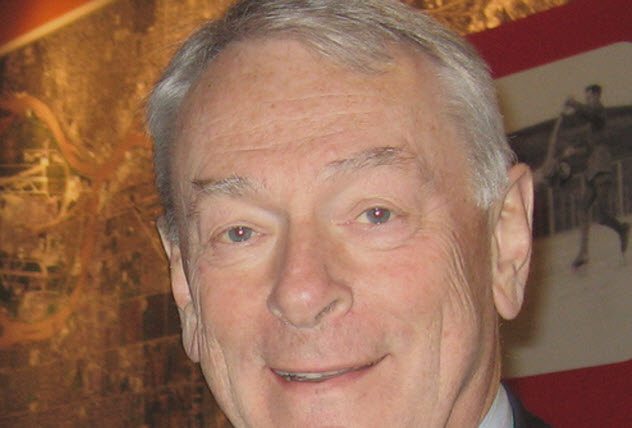
Misty Hyman might have been probed more deeply, though, if Dick Pound had been around. If she had been using steroids, Dick Pound—the greatest force against steroid abuse in the Olympics—would have found out.
Nearly every time you hear about an athlete getting blasted for drug abuse, Dick Pound is behind it. He’s the man who founded the World Anti-Doping Agency and made steroid abuse in sports such a major issue. With his agency, Pound chaired the committee that exposed the use of performance-enhancing drugs in Russia and got Russia banned from the 2018 Olympics.
Dick Pound is also the man who exposed Lance Armstrong. Pound was the first to shed light on the steroid abuse running rampant among competitive cyclists, and he risked everything to do it. He brought Armstrong’s drug use to the public eye and did it so aggressively that Armstrong ran a public campaign to get Dick Pound fired.[6]
For a while, it seemed liked Armstrong had beaten Dick. Armstrong got the IOC to censure Pound and stop his accusation. Pound’s World Anti-Doping Agency, though, wouldn’t stop until the truth came out. By the time Dick Pound was done with him, Armstrong was a mess.
4 Dr. Doctor
The Doctor Who Killed President James Garfield
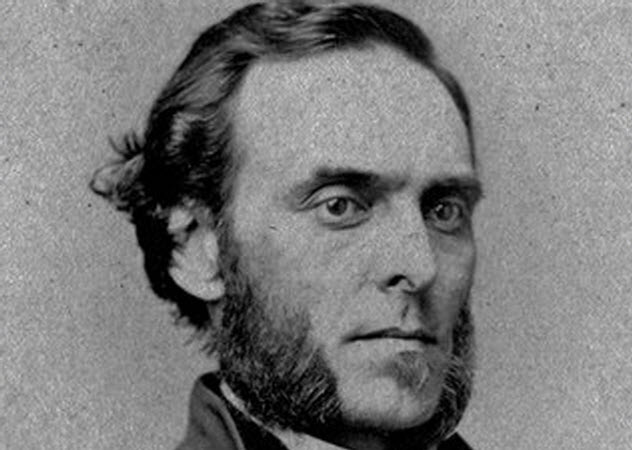
When Doctor Bliss was born, one of the women present declared that they should name him after the doctor who’d delivered him. And so, naturally, his parents named him Doctor.
Having parents who apparently thought that “Doctor” was a first name might go a long way in explaining the rest of Dr. Doctor Bliss’s life. Because Dr. Doctor, as we shall call him, has one of the strangest life stories in history.
Dr. Doctor was the doctor called when President James Garfield was shot. He was tasked with pulling the bullet out of the president’s body before it was too late—but it didn’t go well. Dr. Doctor jabbed his fingers into the president’s body, but he couldn’t find the bullet.
What happened next is so weird that it might sound more like a Wacky Mad Libs than a moment in history, but it really happened. Dr. Doctor decided that the only person who could help was Alexander Graham Bell—the man who invented the telephone. So Alexander Graham Bell rushed over and ran a metal detector over the president’s body, hoping it would beep. It didn’t work.
The shot hadn’t been fatal, but President Garfield died anyway. Dr. Doctor staunchly refused to sterilize his hands or equipment before operating. He thought that antiseptics were hogwash. So he probed his filthy fingers into the president and ended up infecting the wound. In the end, an American president died—not at the hands of his assassin but at the hands of a doctor named Doctor.[7]
3 Anurag Dikshit
Self-Made Billionaire

There are more than a few Dikshits living in India, but this Dikshit is easily the wealthiest of them all. In the early 2000s, when businesses on the Internet were starting to thrive, Anurag Dikshit became one of the youngest billionaires in history.
Anurag Dikshit is the cofounder of PartyGaming, an online gambling network behind websites like PartyPoker.com. He was recruited by a young woman named Ruth Parasol, and together, their company changed the world by making gambling online a major market.[8]
Their website deeply challenged American gambling laws. Dikshit’s business could have been dirty, but working together, Dikshit and Parasol managed to keep it clean. Parasol ran the company from within the United States while Dikshit set up the servers outside the US in countries where they couldn’t be prosecuted for gambling. Through a creative loophole, they managed to keep their company technically legal.
It worked—and soon, Anurag Dikshit was bringing home more than $500 million every year. He and Parasol became some of the richest people on Earth. In the end, they forced the United States to seriously reconsider their gambling laws.
Dikshit sold off his shares and retired when the Justice Department started pressing on them for illegal gambling. He didn’t get out in time to avoid a $300 million fine, but for him, that was little more than a slap on the wrist. Even after retiring young, Anurag was still the richest Dikshit on Earth.
2 Tokyo Sexwale
Nelson Mandela’s Brother-In-Arms
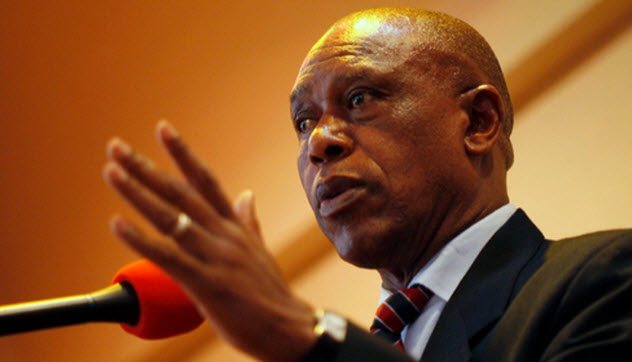
After Nelson Mandela, Tokyo Sexwale ought to be one of the first names we think of when we think of South Africa. He was Mandela’s brother-in-arms, and he is a perfect symbol for the nation.
Tokyo Sexwale’s life story is incredible. He was exiled from South Africa for holding radical ideas like “racism is bad.” But instead of giving up, he bided his time in a Soviet military training camp, getting ready to come back more ferocious than ever. Which he did. Sexwale came back fighting for equality and didn’t stop until he found himself in a prison cell right next to Mandela.[9]
It’s what he did after apartheid ended, though, that makes him the perfect symbol of a united South Africa. Sexwale married a white Afrikaner woman named Judy van Vuuren mere months before apartheid ended. (Yeah, he filed for divorce 20 years later, but at the time, it just worked.)
Sexwale used his newfound freedom to become one of the wealthiest men in South Africa and one of its most important political figures. And, for a while, he was even being groomed to follow Mandela as the next president of the country.
It would all be a perfect, inspiring story for the silver screen if it wasn’t for the risk of a movie called Sexwale drawing in the wrong crowd. And so, instead, we learn about anti-apartheid activists with less embarrassing names like Desmond Tutu.
1 Pupienus
Emperor Of Rome
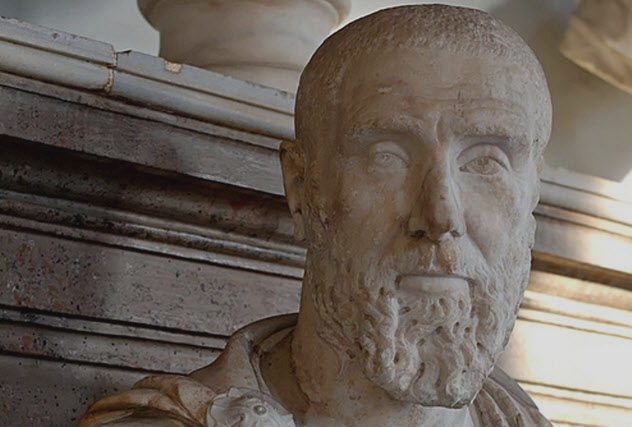
There may be no greater rags-to-riches story than this one. The son of a lowly blacksmith proved himself in war and rose to become the ruler of the greatest empire on Earth. His name was Pupienus Maximus, he was the emperor of Rome, and yes, his name was pronounced “Poopy Anus.”
Pupienus was a military expert. In a few short years, he rose from a place as a common centurion to the leader of the Roman army. He won so many victories for the Roman army that he was made the Urban Prefect of Rome and, in time, the emperor.
Pupienus, though, wasn’t exactly well-liked. He had a reputation for being severe. The Senate wouldn’t let him rule alone, so he was forced to share the empire with Balbinus. Still, whether the empire was his alone or only in part, few had risen from such a lowly place to such a high one.
They were an incredible team for the three months or so that they were in power. For a Roman emperor, that honestly isn’t the shortest reign. Things fell apart when Pupienus went off to war. It turned out that Balbinus wasn’t all that popular after all, so the people rioted against him. By the time Pupienus returned, the people were so angry that the two emperors were captured, dragged into a bathtub, and hacked to pieces.[10]
Still, the life of Pupienus Maximum is an incredible story about just how high someone can climb. And his name even shows up in the odd history book, except that those bashful historians usually just call him “Maximus.”
Read about more unfortunate name choices on 10 Insane Names Parents Tried To Give Their Kids and Top 10 People Whose Names Gave Them Problems.








